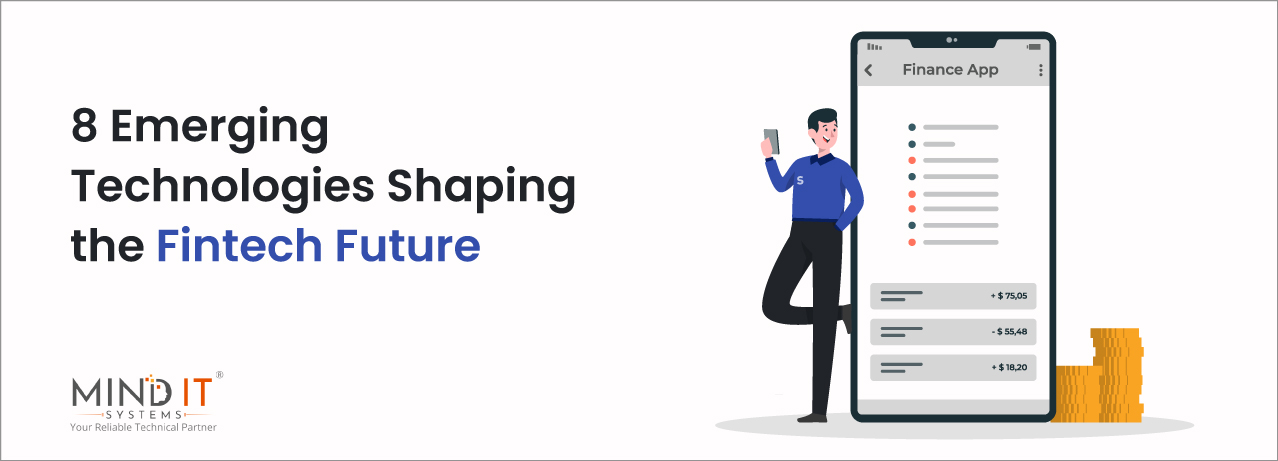
Introduction
Fintech companies face challenges like following regulations, staying safe from cyber threats, and gaining customer trust. Emerging technologies are stepping in to tackle these issues, making the industry smarter and more efficient. These innovations aren’t just about the future—they’re already transforming fintech today and shaping the financial world of tomorrow.
Dive into fintech’s future.
Revolutionize your fintech operations with custom software that adapts to the evolving market.
Here are the 8 Emerging Technologies in the Fintech Sector
1. Artificial Intelligence: A Game-Changer for Fintech
According to McKinsey, AI is expected to generate more than $1 trillion in value per year for the global banking industry. As the sector moves towards an “AI-first” approach, financial institutions are leveraging AI technologies to increase operational efficiency and better serve their customers. A great example of AI in fintech is Bank of America’s Erica, an AI-powered chatbot. Erica helps customers by providing proactive alerts, answering financial queries, and assisting with account management.
How AI is changing fintech:
- Fraud detection: AI can examine suspicious activity in real time, greatly improving the effectiveness of fraud detection systems.
- Customer support: AI-powered virtual assistants are reshaping customer interactions, delivering personalized experiences through chatbots and NLP (natural language processing).
- Advanced decision making: AI algorithms process big data to improve risk management, policy formulation and data-driven decision making.
Forecast: By 2026, the AI market is estimated to contribute $13 trillion to the global economy, with an impressive CAGR of 29.16%. Find the full report here for a deeper insight into this transformative trend.
2. Machine Learning: Enhancing Data Analysis for Smarter Fintech Solutions
Machine Learning (ML) algorithms have the power to unlock hidden patterns in vast amounts of data, enabling financial institutions to make smarter decisions. In fintech, ML is a game-changer, particularly in areas like fraud detection and credit scoring. For example, PayPal leverages ML to analyze transactions in real time, enhancing its fraud detection capabilities and providing a secure and seamless payment experience for users.
How Machine Learning is Driving Change:
- Fraud Prevention: ML algorithms help to identify irregular patterns in transactions, reducing the risk of financial fraud.
- Loan Approvals: ML models predict creditworthiness, leading to faster and more accurate loan approvals.
- Risk Management: ML algorithms enhance risk assessment by identifying potential threats early on.
Machine Learning is transforming fintech by making processes faster, more secure, and highly accurate, paving the way for a more efficient and dynamic financial landscape.
3. Blockchain: Disrupting Traditional Financial Protocols
Blockchain technology is challenging the conventional banking system, offering decentralized, transparent, and secure alternatives to traditional financial processes. A prominent example is Ripple, a leading provider of digital asset infrastructure for financial institutions. It uses blockchain to enable real-time, cross-border payments that are faster and more cost-effective than traditional banking systems.
How Blockchain is Changing the Fintech World:
- Transaction Cost Reduction: Blockchain reduces transaction fees, making cross-border payments faster and cheaper.
- Smart Contracts: These self-executing contracts automate transactions without the need for intermediaries, improving efficiency.
- Enhanced Security: Blockchain’s secure, transparent nature helps mitigate fraud and identity theft, building trust in financial systems.
Impact of Blockchain on Fintech:
- Revolutionizing cryptocurrencies and digital currencies
- Providing identity verification solutions
- Facilitating cross-border payments and smart contracts
4. Internet of Things (IoT): Trust and Security in Finance
The Internet of Things (IoT) is generating massive volumes of data, and fintech is leveraging this to personalize financial services and enhance customer engagement. IoT is finally coming of age, promising to drive a new era of trust and data protection in finance. The best example of this is how Mastercard uses IoT technology to facilitate secure, real-time payment processing with connected devices, allowing users to make safe and seamless transactions.
How IoT Enhances Fintech:
- Personalized Financial Services: IoT helps tailor services based on customer behavior and preferences.
- Risk Assessment: IoT sensors and devices collect real-time data, enabling proactive risk management.
- Fraud Detection: Continuous monitoring of financial activities through IoT devices helps detect and prevent fraud.
5. Cloud Computing: Empowering Financial Services for the Future
By 2030, McKinsey predicts that cloud technology will generate over $1 trillion in EBITDA for the top 500 companies globally. The cloud is transforming how financial institutions operate, providing scalable, cost-effective, and secure solutions. Take for example, Adyen, a global payment platform that uses cloud computing to process transactions for businesses worldwide. Cloud technology helps Adyen scale its operations, reduce costs, and offer a reliable, secure payment experience.
Benefits of Cloud Computing in Fintech:
- Scalability: Cloud platforms enable financial companies to scale operations rapidly without worrying about infrastructure costs.
- Cost Efficiency: Cloud-based solutions eliminate the need for expensive IT infrastructure and reduce operational costs.
- Data Security: Cloud computing offers robust data protection features like zero-trust verification and encryption.
The Future of Fintech with Cloud:
The adoption of cloud technologies is set to propel the global fintech market to $124.3 billion by 2025. With its flexibility and scalability, the cloud is driving innovation and playing a key role in the expansion of digital financial services.
6. Open Source & SaaS: The Backbone of Digital Transformation
Open-source software and Software-as-a-Service (SaaS) solutions are empowering fintech companies to innovate quickly, reducing development time and operational costs. For example, Stripe provides a SaaS-based payment solution, enabling fintech companies to integrate payment systems quickly and cost-effectively. This approach accelerates innovation and scalability while reducing development costs.
How Open Source & SaaS Are Transforming Fintech:
- Faster Deployment: Open-source solutions and SaaS platforms allow for faster deployment, enabling businesses to remain competitive.
- Reduced Costs: SaaS eliminates the need for heavy infrastructure investments, reducing operational costs.
- Global Collaboration: Open-source fosters collaboration across teams, accelerating development and innovation in fintech.
7. Low Code/ No Code Platforms: Democratizing Fintech Development
Low-code/no-code platforms are revolutionizing fintech software development by allowing users to create applications with minimal coding. These platforms enable faster development cycles and reduce the reliance on highly specialized software talent. Take OutSystems, for example, a low-code platform that allows fintech companies to quickly create digital solutions, enhancing efficiency and customer engagement.
Key Benefits of Low Code/ No Code in Fintech:
- Faster Development: Create applications rapidly with intuitive drag-and-drop features.
- Lower Costs: Reduced need for specialized developers leads to cost savings.
- Improved Agility: Quickly adapt to shifting business needs and regulatory requirements.
Market Forecast: The global low-code application development platform market is expected to grow at a CAGR of 22.7% from 2022 to 2027
8. Robotic Process Automation (RPA): Streamlining Fintech Operations
Robotic Process Automation (RPA) is streamlining repetitive tasks in the financial sector, from account opening to transaction processing, helping financial institutions reduce errors and improve efficiency. A good example is American Express, where RPA automates dispute handling and transaction verifications, improving operational speed and reducing costs.
Use Cases of RPA in Fintech:
- Account Management: Automate account opening and KYC processes.
- Transaction Processing: RPA handles large volumes of transactions with minimal human intervention.
- Customer Inquiries: RPA assists in answering common customer queries efficiently.
Future Scope of Fintech Companies in 2025 and Beyond
The fintech landscape is being transformed by emerging technologies that enhance security, improve operational efficiency, and provide personalized customer experiences. Artificial Intelligence, Machine Learning, Blockchain, IoT, Cloud Computing, and other technologies are not just trends but profoundly reshaping the financial sector.
As fintech companies embrace these innovations, they are positioning themselves to thrive in an increasingly digital and competitive world. The next decade promises even more disruptive breakthroughs, paving the way for a new era of financial services that are smarter, faster, and more secure.
In this rapidly evolving environment, the ability to adapt to these technologies will define the winners in the fintech space. Redefine the future by acting today.
Stay ahead in the fintech game with expert insights and solutions built for tomorrow.
Share this post
About the Author

Sujoy Roy
(Head – Digital Marketing)
From my teenage time, I had a quench to solve problems and loved leadership. Starting my career in relation management, ignited my passion for managing people. While managing I realized technology needs to be incorporated to keep pace with the changing world & do my work efficiently.

